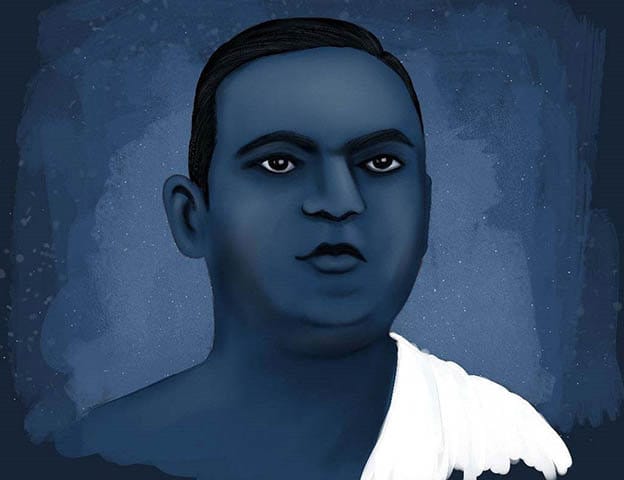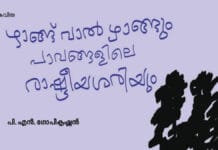Poykayil Yohannan, popularly known as Poykayil Appachan, was a Dalit Christian reformer, poet, and social revolutionary from Kerala. His poem About My Race: A Song is an intensely personal yet collective lament over the historical erasure, marginalisation, and demonisation of his community. The poem delves into the complexities of race, culture, and the struggles faced by the poet’s community.
The poem is translated into English from Malayalam by Jessica Sudhir M. The concept of “race” refers to the evicted and marginalised First Peoples of Kerala. Poykayil Appachan was also known as Sree Kumara Gurudevan. He was a revolutionary Dalit leader and social reformer hailing from Central Travancore. His parents worked for a wealthy Christian family as enslaved people. He started his work as a preacher at the age of 17. However, he left the church later and started his own organisation called Pratyaksha Raksha Deiva Sabha. He attempted to organise the early inhabitants of the region. He was also a member of Sadhu Jana Paripalana Sangham, which a social reformer and Dalit leader, Ayyankali, founded in 1907. Appachan’s speeches and songs contributed to the democratisation of society and polity. About My Race: A Song depicts one such example, which he recited in the Legislative Assembly of Travancore in 1921.
The poem is structured in a way that captures the poet’s introspection and contemplation about his race. It explores themes of pride, resilience, and the enduring spirit of the poet’s people. The use of language and imagery in the poem conveys a sense of nostalgia and longing for the poet’s roots. Appachan’s poem also addresses the challenges and discrimination faced by his race, shedding light on the social and political context in which the poet’s identity is situated. The poem serves as a powerful expression of cultural pride and a call for recognition and respect.

About My Race: A Song opens with a concern about numerous versions of history that exist in which the downtrodden people of the land are not present. On the contrary, historical narratives about other prominent races or castes are many in which the First Nations people are poorly represented. Appachan problematises the conspicuous absence of references to First Nation people in the history of our country. It is important to note that the way downtrodden people are portrayed in mainstream history is still a point of debate. Appachan uses the plural term “histories” to denote the existence of parallel narratives. According to him, none of those narratives does justice to the First Nation population, the earliest inhabitants of the land.
There was no one to write the history of the poet’s race because his race was the earliest inhabitants of this land. Poykayil Appachan invokes the analogy of a scribe to illustrate the concept of disseminating knowledge. The earliest inhabitants were ignored because no one wrote their history. This thought grieves the poet because he realises the importance of written history. The absence of his race from the histories of the present time saddens the poet. Colonial forces have used writing as a tool to construct identities. Such an agenda was never part of the First Nations communities, especially in premodern times.
The poet wants to write a story about how the earliest occupants came to be regarded in Kerala. He reveals that he is not ashamed to acknowledge the weaknesses of his race, if any, openly. His race has been called “the cursed progeny” by the mainstream society. Poykayil Appachan intends to deconstruct popular notions regarding the marginalised race of the First Nation people.
The poet dismisses any sense of “shame” associated with the present condition of his race because he understands that shame is a product of the mainstream culture. He does not see any fault in openly narrating all the weaknesses of his race. The politics of marginalising the First Peoples is primarily fuelled by the mainstream culture to authenticate its supremacy. Everything that does not fit into the mainstream notions of cleanliness, beauty, and intelligence shall be viewed as aberrations and blamed. Appachan subverts this discourse by dismissing any sense of shame.
The poem, About My Race: A Song has 8 stanzas. The reference to divinity or “God” appears in the final stanza of the poem. The poet asks how God can allow the injustice of racism to continue. The poet refers to the concept of God endorsed by creationism. According to this concept, God is a supreme being who created every living and nonliving entity on the earth. The question posed by the poet reflects the hopelessness he felt upon witnessing the harsh reality of racism. It is interesting to meditate on how the poet arrives at the final question. He states that the mainstream forces in Kerala’s culture blame the First Nations without any inhibition. Before bringing God into the poem, the poet asks whether racial discrimination will continue endlessly. This question gives the poem a tone of hopelessness, which is cemented by the final stanza.
Theme of Erasure and Resistance
The central theme of the poem is historical erasure. Appachan mourns the fact that while other races have histories, his community remains unrecorded. This absence is not mere forgetfulness—it is the outcome of caste oppression. By turning to song, Appachan resists this erasure, creating an alternative oral history that affirms his community’s existence.
Voice of the Marginalised
The poem speaks not in abstract terms but in the direct, collective voice of the oppressed. The repeated phrase “my race” personalises and politicises the lament, turning the poem into an anthem of identity. It demonstrates how poetry can serve as an archive for marginalised voices excluded from written history.
Honesty and Courage
Appachan’s willingness to say “the faults of my caste” reflects extraordinary honesty. Yet he contrasts this humility with the cruel reality that his people are blamed eternally, demonised without end. This exposes the hypocrisy of a caste society, which never forgives or redeems those it has condemned.
Theological Questioning
The poem concludes with a radical theological challenge. By asking how God can allow such injustice, Appachan destabilises the conventional religious justifications for caste. His protest is not only social but also spiritual, pointing to the contradictions between divine justice and human cruelty.
Style and Expression
The style is plain, direct, and rhythmic, reflecting its oral-song tradition. The use of repetition—”not a single letter is seen on my race”—emphasises absence and silencing. The tone alternates between sorrow and defiance, making it both a lament and a declaration of resilience.
About My Race: A Song is both a cry of pain and a song of defiance. It foregrounds the historical absence of Dalit voices, critiques the structures that demonised them, and insists on reclaiming identity through poetry. Poykayil Appachan transforms lament into resistance, giving dignity and voice to a community erased from written history. The poem’s power lies in its simplicity, honesty, and moral urgency, making it not only a work of literature but also a social and spiritual manifesto.




























